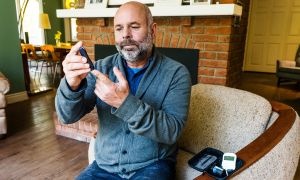Advertisement
Diet controlled diabetes is when blood sugar levels are controlled through diet and exercise or in other words-a healthy lifestyle. People with type 1 diabetes are unable to control their blood sugar readings from diet and exercise alone and must inject insulin along with following a healthy lifestyle. People with prediabetes or type 2 diabetes may be prescribed to manage their diabetes through diet and exercise alone as they may produce some insulin but not enough that their blood sugar readings are slightly elevated. No matter what route you are prescribed to manage blood sugar levels, diet and exercise are always a part of the prescription.
Continue Learning about Diabetes
Important: This content reflects information from various individuals and organizations and may offer alternative or opposing points of view. It should not be used for medical advice, diagnosis or treatment. As always, you should consult with your healthcare provider about your specific health needs.






